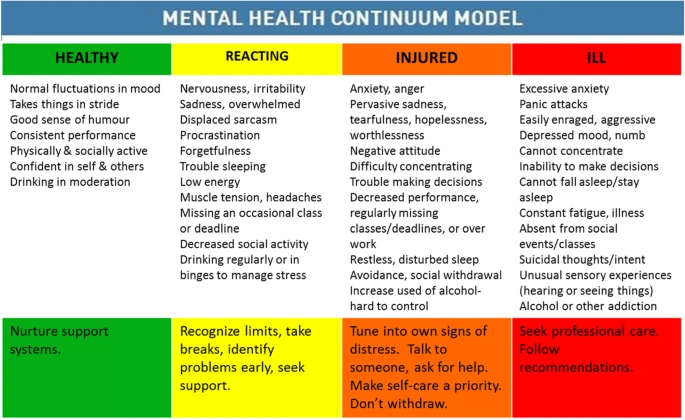When we say mental health, what do we mean?
Mental health is a combination of our emotional, psychological and social well-being and not just the avoidance of serious mental illness. All of these combined affects how we feel, act, think, how we handle stress and even how we relate to others. Good mental health is important at every stage of our life.
Mental Illness
By age 40, 50% of the population will or have had a mental illness. Research has suggested that genetic family history can increase the likelihood of mental health conditions. However, other factors contribute to the development of these mental health conditions which means just because you have a gene that is linked to a mental health illness, it is not guaranteed that this condition will develop.

Mental Health Continuum Model (Source: Canadian Armed Forces)
The Mental Health Continuum Model was developed by The Department of National Defence Canadian Armed Forces to demonstrate that mental health ranges on a continuum. This model was developed as a self-reflection tool to help identify in themselves and others when they are in need of help and to take appropriate action.
Suicide Prevention
It has been estimated that about 90% of those who die by suicide have a mental health condition, but most people with mental health condition do not die by suicide.
- Are you thinking of killing yourself?
- Have you thought of how you would do that?
- Do you have the means?
- Have you thought of when?
If you get to question four and that person has thought out the entire process, treat this as a medical emergency by calling 911 or follow your policies and procedures if you are in your workplace. If the individual answers “no” to any of the above, continue with rapport building and direct them to resources. For local mental health resources visit: https://www.albertahealthservices.ca/amh/Page14063.aspx

ACES, Mental health and Drug use
Our childhood experiences shape our minds and how we interact with the world around us. Adverse Childhood Experiences (ACEs) increase the risk of mental and physical illness later in life which can include substance use disorders. ACES are stressful negative experiences which can include dysfunctional home life, abuse, and neglect before the age of 18. By understanding how ACEs affect our brain is very important in identifying risks mental and physical illness and substance use problems. With this in mind, it can also help identify where it is possible to provide intervention to prevent and treat substance abuse later in life.
